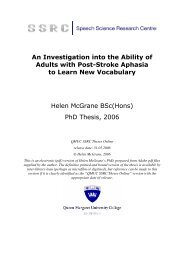QM News 74 (pdf 1.58 MB) - Queen Margaret University
QM News 74 (pdf 1.58 MB) - Queen Margaret University
QM News 74 (pdf 1.58 MB) - Queen Margaret University
Create successful ePaper yourself
Turn your PDF publications into a flip-book with our unique Google optimized e-Paper software.
PAGE 0<br />
What are universities for?<br />
Professor Wend presents her professorial lecture at the Royal College of Physicians<br />
In October, Professor Petra Wend,<br />
Principal and Vice-Chancellor of <strong>QM</strong>U,<br />
presented a very timely professorial<br />
lecture on the role of universities.<br />
The audience, which filled the large<br />
lecture theatre in the Royal College of<br />
Physicians, included a range of senior<br />
figures from the education, health,<br />
cultural and business sectors.<br />
After taking the audience on a journey<br />
through the history of universities<br />
throughout the world, Professor Wend’s<br />
lecture tackled one of the biggest<br />
questions – what are universities for?<br />
Within that context, she discussed the<br />
modern role of universities in Britain and<br />
the way in which they are managed and<br />
financed.<br />
In recent months and years, there<br />
has been much public debate about<br />
the funding and role of universities in<br />
Scotland and the rest of the UK. On the<br />
one hand we hear about knowledge<br />
exchange, skills development and the<br />
closer alignment of these to the needs<br />
of industry, while on the other, we hear<br />
about further concentration of research<br />
funding in centres of excellence.<br />
Equally, there are strong signals about<br />
the differences between regional and<br />
national or international universities and<br />
a perceived duplication of provision in<br />
‘regional’ universities.<br />
In balancing these competing pressures,<br />
Professor Wend warned that we need to<br />
proceed with care. While it is absolutely<br />
right for society to seek the best value<br />
from its investment in universities, she<br />
argued that we need to ensure that<br />
we build on the diverse ways in which<br />
every university contributes to Scotland’s<br />
success.<br />
She sees five roles for universities:<br />
• education;<br />
• research and innovation;<br />
• public engagement;<br />
• economic development and<br />
• social inclusion and mobility.<br />
In order to fulfil all of these functions, she<br />
believes that an additional important role<br />
of a university is to maintain and/or rebalance<br />
the diversity of functions within<br />
its institution to define its unique mission<br />
and vision.<br />
Professor Wend argued that to be<br />
successful and useful, every university<br />
needs to fulfil each of these roles. This<br />
means, for example, that research<br />
should not be restricted to a limited<br />
number of universities.<br />
She said: “Universities can and should<br />
have multiple functions providing<br />
research, education, public engagement,<br />
economic development and social<br />
mobility.”<br />
Professor Wend argued that a university<br />
that is forced to fulfil only one role at<br />
the expense of the other ceases being<br />
a university and fails in its potential<br />
for contributing to the economic and<br />
social welfare of society. She strongly<br />
believes that it is the current potent mix<br />
of universities’ multifaceted functions and<br />
the way these are inseparable from each<br />
other that make them leaders for a better<br />
society.<br />
The text, PowerPoint presentation<br />
and film of Professor Wend’s<br />
professorial lecture can be downloaded<br />
at: www.qmu.ac.uk/community/<br />
<strong>QM</strong>PublicLecturesarchive.htm
















